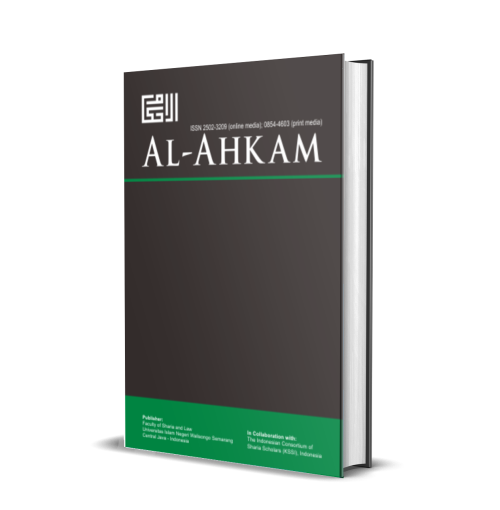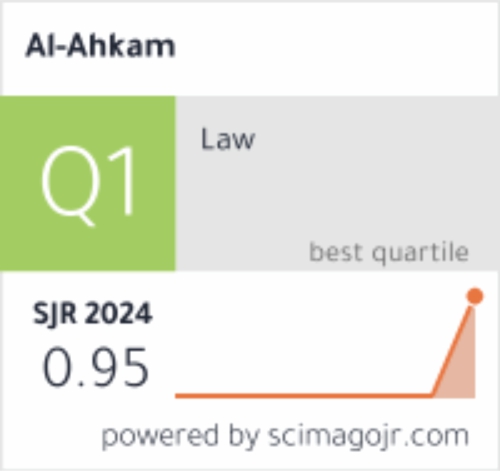Post-Divorce Rights of Women and Children in Pekalongan City, Central Java: Challenges in Islamic Law Analysis
DOI:
https://doi.org/10.21580/ahkam.2024.34.1.20624Keywords:
children’s rights, post-divorce, women’s rightsAbstract
The rights of women and children after divorce are often neglected. The article examines the reality of children's and women's rights in Pekalongan City, Central Java, Indonesia, focusing on the causes of non-fulfillment and the legal consequences. Data from 10 court decisions from the Pekalongan City Religious Court revealed a gap between post-court decision reality and the fulfillment of these rights. The research found that the non-fulfillment of children's and women's rights after divorce in Pekalongan is due to a lack of public knowledge about post-divorce execution procedures and related rights. The difficulty of spouses in ensuring the fulfillment of these rights is also reflected in the lack of application of Islamic legal knowledge on the obligation to provide maintenance by husbands. The legal consequences are devastating, emphasizing the need for improvements in the legal system, increased public knowledge, and the application of Islamic legal principles.Downloads
References
Adriansyah, Adriansyah. ‘Pemenuhan Hak Perempuan dan Anak pada Putusan Verstek di Pengadilan Agama’. Fenomena: Jurnal Penelitian 13, no. 2 (2021): 187–202. https://journal.uinsi.ac.id/index.php/fenomena/
article/article/view/4500.
Alfitri, Alfitri. ‘Protecting Women from Domestic Violence: Islam, Family Law, and the State in Indonesia’. Studia Islamika 27, no. 2 (2020): 273–307. https://doi.org/10.36712/sdi.v27i2.9408.
Ali, Zainudin. Metode Penelitian Hukum. Jakarta: Sinar Grafika, 2011.
Ali, Zainudin. Sosiologi Hukum. Jakarta: Sinar Grafika, 2002.
Annur, Cindy Mutia. ‘Kasus Perceraian di Indonesia Melonjak Lagi pada 2022, Tertinggi dalam Enam Tahun Terakhir’. Databoks, 1 March 2023. https://databoks.katadata.co.id/datapublish/2023/03/01/kasus-perceraian-di-indonesia-melonjak-lagi-pada-2022-tertinggi-dalam-enam-tahun-terakhir.
Anwar, Etin. Gender and Self in Islam. London: Routledge, 2006. https://doi.org/10.4324/9780203799628.
Ayu, Dena, Mursal Mursal, Putri Jianti, Doli Witro, and Rifqi Nurdiansyah. ‘A Sociological Approach to Consumer Protection in E-Commerce Transactions During the Covid-19 Pandemic’. Khazanah Hukum 4, no. 3 (2022): 181–91. https://doi.org/10.15575/kh.v4i3.18690.
Blumer, Herbert. Symbolic Interactionism: Perspective and Method. Oakland: University of California Press, 1986.
Bone, Amra. ‘Islamic Marriage and Divorce in the United Kingdom: The Case for a New Paradigm’. Journal of Muslim Minority Affairs 40, no. 1 (2020): 163–78. https://doi.org/10.1080/13602004.2020.1737412.
Bonnet, Carole, Bertrand Garbinti, and Anne Solaz. ‘The Flip Side of Marital Specialization: The Gendered Effect of Divorce on Living Standards and Labor Supply’. Journal of Population Economics 34, no. 2 (2021): 515–73. https://doi.org/10.1007/s00148-020-00786-2.
Busni, Darti, Doli Witro, Iwan Setiawan, Nana Herdiana Abdurrahman, and Raid Alghani. ‘Implementation of the Hybrid Contract Concept in Multiservice Ijarah Financing as a Financing Alternative Health Service in the Covid-19 Pandemic’. JURIS (Jurnal Ilmiah Syariah) 21, no. 1 (2022): 11–25. https://doi.org/10.31958/juris.v21i1.5173.
DeAnda, Jacqueline S., Michael R. Langlais, Edward R. Anderson, and Shannon M. Greene. ‘After the marriage is over: Mothers’ Separation Distress and Children’s Postdivorce Adjustment’. Family Relations 69, no. 5 (2020): 1113–27. https://doi.org/10.1111/fare.12434.
Demery, Ahmed Mohamed El. ‘Protecting Women and Children under Egyptian Family Law: A Journey of Increasing Rights’. In Human Flourishing: The End of Law, 631–74. Leiden: Brill | Nijhoff, 2023. https://doi.org/10.1163/9789004524835_021.
Djawas, Mursyid, Khairuddin Hasballah, Soraya Devi, Muntasir A. Kadir, and Yusfriadi Abda. ‘The Construction of Islamic Inheritance Law: A Comparative Study of the Islamic Jurisprudence and the Compilation of Islamic Law’. JURIS (Jurnal Ilmiah Syariah) 21, no. 2 (2022): 207–19. https://ojs.iainbatusangkar.ac.id/ojs/index.php/Juris/article/view/7495.
Djawas, Mursyid, Ridhwan Ridhwan, Soraya Devy, and Asmaul Husna. ‘The Government’s Role in Decreasing Divorce Rates in Indonesia: A Study of Its Factors and Impacts in Aceh and South Sulawesi’. Ahkam: Jurnal Ilmu Syariah 21, no. 1 (2021). https://doi.org/10.15408/ajis.v21i1.20870.
Farid, Diana, Muhammad Husni Abdulah Pakarti, Iffah Fathiah, Hendriana Hendriana, and Mohamad Hilal Nu’man. ‘Marriage and Divorce Practices in the Society of Bandung: Contestation of Islamic and State Law’. al-Qadha: Jurnal Hukum Islam dan Perundang-Undangan 10, no. 1 (2023): 65–78. https://doi.org/10.32505/qadha.v10i1.5673.
Firdaus, Firdaus, Ismail Ismail, Busyro Busyro, Endri Yenti, and Mohd Nasran Mohamad. ‘Post-Divorce Child’s Nafaqah Māḍiyah: An Analysis of the Shifting from Fulfilment to the Assertion of Ownership Rights’. al-Ahkam 33, no. 1 (2023): 45–62. https://doi.org/10.21580/ahkam.2023.33.1.14566.
Grosso, Sarah. ‘Women’s Rights on Trial: Gender Equality in a Family Court in Ben Ali’s Tunisia’. In The Asian Yearbook of Human Rights and Humanitarian Law, 219–42. Leiden: Brill | Nijhoff, 2019. https://doi.org/10.1163/9789004401716_011.
Heaton, Tim, and Mark Cammack. ‘Explaining the Recent Upturn in Divorce in Indonesia: Developmental Idealism and the Effect of Political Change’. Asian Journal of Social Science 39, no. 6 (2011): 776–96. https://doi.org/10.1163/156853111X619229.
Hewitt, Sarah, Jane Mills, Karen Hoare, and Nicolette Sheridan. ‘Grounded Theory Method and Symbolic Interactionism: Freedom of Conceptualization and the Importance of Context in Research’. Forum Qualitative Sozialforschung Forum: Qualitative Social Research 23, no. 3 (2022). https://doi.org/10.17169/fqs-23.3.3807.
Hoskin, Rhea Ashley, and Karen L. Blair. ‘Critical Femininities: A “New” Approach to Gender Theory’. Psychology & Sexuality 13, no. 1 (2022): 1–8. https://doi.org/10.1080/19419899.2021.1905052.
Huang, Ya-Hui, and Yan Ma. ‘Climate Change and Divorce Behavior: Implication for Family Education’. Innovation and Green Development 3, no. 1 (2024): 100115. https://doi.org/10.1016/j.igd.2023.100115.
Irfan, Muhammad, Damrah Khair, Habib Shulton Asnawi, and Linda Firdawaty. ‘Reflection of a Decade of Pre-Marriage Guidance on Family Resilience in Indonesia’. SMART: Journal of Sharia, Tradition, and Modernity 1, no. 2 (2021): 188. https://doi.org/10.24042/smart.v1i2.11353.
Jones, Gavin Willis. ‘Muslim and Non-Muslim Divorce Trends in Southeast Asia in the 21st Century’. Asian Journal of Social Science 51, no. 3 (2023): 137–45. https://doi.org/10.1016/j.ajss.2023.04.004.
Kamarusdiana, Kamarusdiana, Burhanudin Yusuf, Maman Rahman Hakim, and Harapandi Dahri. ‘Pre-Marital Education: Concepts and Regulations in Indonesia and Malaysia’. al-Ahkam 32, no. 1 (2022): 41–64. https://doi.org/10.21580/ahkam.2022.32.1.10709.
Kholidah, Muhammad Ridho, Sobhan, and Mahyudin Ritonga. ‘Violation of Women’s Rights on Divorce: Study on Religious Court Decision’. Journal of Law and Sustainable Development 11, no. 6 (2023): e1230. https://doi.org/10.55908/sdgs.v11i6.1230.
Kreyenfeld, Michaela, and Heike Trappe. ‘Introduction: Parental Life Courses After Separation and Divorce in Europe’. In Parental Life Courses after Separation and Divorce in Europe, 3–21. Cham, Switzerland: Springer, 2020. https://doi.org/10.1007/978-3-030-44575-1_1.
Kurniawan, Muhammad Irfanudin, and Adi Nur Rohman. ‘Reasons for Divorce in the Compilation of Islamic Law: An Overview of Islamic Legal Psychology’. Krtha Bhayangkara 17, no. 3 (2023): 495–504. https://doi.org/10.31599/krtha.v17i3.3085.
Latif, Mukhlis, and Muhammad Mutawalli. ‘Fiqh of Civilization in Building a Legal State: The Relevance of Muhammad Arkoun’s Thought’. al-Ahkam 33, no. 2 (2023): 207–30. https://doi.org/10.21580/ahkam.2023.33.2.16643.
Mayer, Ann Elizabeth. ‘Issues Affecting the Human Rights of Muslim Women’. In Women and International Human Rights Law, 367–77. Leiden: Brill | Nijhoff, 2000. https://doi.org/10.1163/9789004531130_015.
McPhail, Clark, and Cynthia Rexroat. ‘Mead vs. Blumer: The Divergent Methodological Perspectives of Social Behaviorism and Symbolic Interactionism’. American Sociological Review 44, no. 3 (1979): 449–67. https://doi.org/10.2307/2094886.
Mubarokah, Nida Farhani, Nisaul Hasanah, and Uswatun Mahmudah. ‘The Concept of Feminism in Islamic Education’. Nazhruna: Jurnal Pendidikan Islam 4, no. 3 (2021): 646–62. https://doi.org/10.31538/nzh.v4i3.1634.
Musarrofa, Ita, and Holilur Rohman. ‘’Urf of Cyberspace: Solutions to the Problems of Islamic Law in the Digital Age’. al-Ahkam 33, no. 1 (2023): 63–88. https://doi.org/10.21580/ahkam.2023.33.1.13236.
Nancarrow, Heather, Kate Thomas, Valerie Ringland, and Tanya Modini. ‘Accurately Identifying the “Person Most in Need of Protection” in Domestic and Family Violence Law’. ANROWS Research Reports. Sydney, 2020. https://www.anrows.org.au/publication/accurately-identifying-the-person-most-in-need-of-protection-in-domestic-and-family-violence-law/.
Nurjaman, Muhamad Izazi, and Doli Witro. ‘The Relevance of the Theory of Legal Change according to Ibnu Qayyim al-Jauziyyah in Legal Products by Fatwa DSN-MUI Indonesia’. el-Mashlahah 11, no. 2 (2021): 164–86. https://doi.org/10.23971/elma.v11i2.3181.
Qomaro, Galuh Widitya. ‘Agensi Hakim Pengadilan Agama Bangkalan dalam Pemenuhan Hak Istri Pasca Cerai’. Mahkamah: Jurnal Kajian Hukum Islam 6, no. 1 (2021): 63–78. https://doi.org/10.24235/mahkamah.v6i1.7455.
Radbruch, Gustav. ‘Law’s Image of the Human’. Oxford Journal of Legal Studies 40, no. 4 (2020): 667–81. https://doi.org/10.1093/ojls/gqaa026.
Rasidin, Mhd., Natardi Natardi, and Doli Witro. ‘The Impact of Unequal Marriage on Household Harmony (Case Study in Sungai Penuh City, Jambi)’. Samarah: Jurnal Hukum Keluarga dan Hukum Islam 4, no. 2 (2020): 314–36. https://doi.org/10.22373/sjhk.v4i2.8083.
Rasidin, Mhd, Doli Witro, Rahmi Diana, Moh Nailul Muna, Imaro Sidqi, and Hening Sukma Daini. ‘The Mapping Verses and Application of the Linguistic Approach and Uṣūl Fiqh Toward the Law of Adultery’. el-Mashlahah 14, no. 1 (2024): 21–42. https://e-journal.iain-palangkaraya.ac.id/index.php/maslahah/article/view/7354.
Rinaldo, Rachel, Eva F. Nisa, and Nina Nurmila. ‘Divorce Narratives and Class Inequalities in Indonesia’. Journal of Family Issues 45, no. 5 (2024): 1195–1216. https://doi.org/10.1177/0192513X231155657.
Rohmawati, Ari, Meiwatizal Trihastuti, Aris Suryaningsih, and Habib Ismail. ‘Potrait of Social Interaction among the Vilagers in the Perspective of George Herbert Mead’s Symbolic Interactionalism Theory’. International Journal on Advanced Science, Education, and Religion 4, no. 1 (2021): 41–49. https://doi.org/10.33648/ijoaser.v4i1.94.
Saleh, Taufiq, Khalisah Hayatuddin, and Arif Wisnu Wardhana. ‘Factors of Unfulfilled Rights of Wife and Children as Consequences of Divorce in Religious Court Decisions’. Nurani: Jurnal Kajian Syari’ah dan Masyarakat 23, no. 1 (2023): 85–96. https://doi.org/10.19109/nurani.v23i1.16644.
Shaari, Mohd Shahidan, Diana Nabila Chau, Temitayo Blessing Majekodunmi, and Miguel Angel Esquivias. ‘Understanding the Role of Child Abuse in Divorce: A Socioeconomic Analysis Using the ARDL Approach’. Social Sciences & Humanities Open 8, no. 1 (2023): 100762. https://doi.org/10.1016/j.ssaho.2023.100762.
Sholeh, Aziz, Dian Rachmat Gumelar, and Aah Tsamrotul Fuadah. ‘Pendampingan Hak-Hak Perempuan dan Anak Pasca Perceraian’. JCIC: Jurnal CIC Lembaga Riset dan Konsultan Sosial 1, no. 2 (2019): 80–99. https://doi.org/10.51486/jbo.v1i2.19.
Sirman Dahwal, and Dimas Dwi Arso. ‘Rights and Obligations of a Husband as a Civil Servant to His Ex-Wife after Divorce according to Indonesian Law’. Bengkoelen Justice: Jurnal Ilmu Hukum 13, no. 2 (2023): 244–73. https://doi.org/10.33369/jbengkoelenjust.v13i2.31118.
Sitompul, Kristina Pujasari, Nur Anisa Simbolon, Muhammad Rifai, and Sri Hadiningrum. ‘The Position of Islamic Law in Fulfilling Women’s Rights during the Iddah Period’. JISIP (Jurnal Ilmu Sosial dan Pendidikan) 8, no. 1 (2024): 532. https://doi.org/10.58258/jisip.v8i1.6316.
Soeroso, R. Pengantar Ilmu Hukum. Jakarta: Sinar Grafika, 2011.
Sudrajat, Shinta Azzahra, Arzam Arzam, and Doli Witro. ‘Legal Protection in Labor Dispute Settlement through Industrial Relations Mechanism’. Khazanah Hukum 4, no. 1 (2022): 1–9. https://doi.org/10.15575/kh.v4i1.17027.
Uyar, Nilüfer, and İbrahim Yildirim. ‘Post-Divorce Emotion/Social Adjustment of Women: Effectiveness of a Psycho-Education Program Based on Cognitive Behavioral Theory’. Türk Psikolojik Danışma ve Rehberlik Dergisi 13, no. 70 (2023): 330–44. https://doi.org/10.17066/tpdrd.1265738.5.
Wahyu Sururie, Ramdani, Eva Nur Hopipah, Doli Witro, Rahmi Diana, and Muhammad Sopiyan. ‘Co-Parenting Model in Resolving Child Custody Disputes in Urban Muslim Families’. Petita: Jurnal Kajian Ilmu Hukum dan Syariah 9, no. 1 (2024): 250–68. https://doi.org/10.22373/petita.v9i1.277.
Wardatun, Atun, and Bianca J. Smith. ‘Woman-Initiated Divorce and Feminist Fiqh in Indonesia: Narrating Male Acts of Nushūz in Marriage’. Ulumuna 24, no. 2 (2020): 266–95. https://doi.org/10.20414/ujis.v24i2.416.
Yani, Ahmad, Sumarni Alam, and Edi Mulyadi. ‘Perlindungan Hukum terhadap Hak-Hak Perempuan dan Anak Pasca Perceraian menurut Peraturan Perundang-Undangan yang Berlaku’. Jurnal Pemandhu 2, no. 3 (2021): 299–313. https://ejournal.unis.ac.id/index.php/JM/article/view/2173.
Yara, Olena, Anatoliy Brazheyev, Liudmyla Golovko, and Viktoriia Bashkatova. ‘Legal Regulation of the Use of Artificial Intelligence: Problems and Development Prospects’. European Journal of Sustainable Development 10, no. 1 (2021): 281–89. https://doi.org/10.14207/ejsd.2021.v10n1p281.
Yuliartini, Ni Putu Rai. ‘Legal Protection of Women and Children from Violence in the Perspective of Regional Regulation of Buleleng Regency Number 5 Year 2019’. Jurnal Pendidikan Kewarganegaraan Undiksha 9, no. 1 (2021): 89–96. https://ejournal.undiksha.ac.id/index.php/JJPP/article/view/31431.
Downloads
Published
How to Cite
Issue
Section
License
By submitting an article to the journal, the author(s) agree to transfer the published article's copyright to the journal, which will act as the publisher. This means the journal will have the right to publish the article in various forms, including reprints. The journal will maintain the publishing rights to the published articles.
In line with the license, authors and third parties (readers, researchers, and others) are allowed to share and adapt the material. In addition, the material must be given appropriate credit, provided with a link to the license, and indicated if changes were made. If authors remix, transform or build upon the material, authors must distribute their contributions under the same license as the original.



